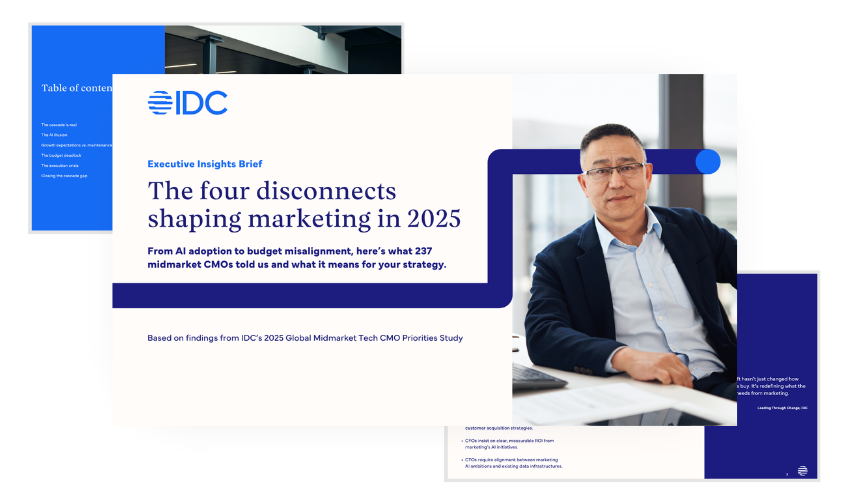AI is quickly transforming what marketing teams are capable of: automating routine tasks, delivering instant insights, and powering deeply personalized customer experiences. But for all its promise, AI is only as effective as the people and processes guiding it.
And that’s where many organizations are hitting a wall.
As marketing strategies grow more complex and technology becomes more advanced, the internal capabilities needed to execute at scale haven’t kept pace. The result? A widening execution gap: the disconnect between what marketing promises and what teams are equipped to deliver.
Thirty-seven percent of CMOs say creating a unified omnichannel experience will have the greatest influence on their marketing strategy over the next 12-18 months, according to IDC’s 2025 Global Midmarket Tech CMO Priorities Survey.
Yet in practice, most teams lack the operational infrastructure to make that experience a reality. Defined roadmaps, repeatable processes, and specialized talent remain in short supply. Only 15% of CMOs say upskilling or hiring for new roles such as AI prompters, data scientists, or digital experience designers is a top priority.
That percentage is strikingly low given what lies ahead. Over the next two years, more than a quarter of digital marketing, journey orchestration, and campaign optimization tasks are expected to shift to AI.
This is the execution gap in action, and it is one of the four critical disconnects IDC has identified for marketing today.
For CMOs ready to get ahead, IDC’s data-backed guidance offers a clear starting point.
Download The Executive Insights Brief: The four disconnects shaping marketing in 2025 to explore three actionable strategies for building the talent and capabilities your team needs to close the execution gap.
Skills gaps puts CMOs out of step with the C-suite
So where is the focus instead?
Currently, many teams are prioritizing customer retention and cost reduction — another of IDC’s identified disconnects. Looking ahead, priorities are expected to shift toward customer acquisition. But even then, areas like MarTech modernization, AI implementation, and upskilling continue to rank lower than expected, despite mounting pressure from the top.
Thirty-four percent of midmarket CMOs say their executive team expects modernization of MarTech, including AI integration, in the next 12 to 18 months.
The expectation is clear: marketing must lead with speed, precision, and scalable results.
CMOs acknowledge the need for bold. But without internal talent to support execution, strategies stall before they scale.
Meeting buyer expectations requires the right talent
This pressure isn’t just coming from the C-suite. Buyers are raising the bar, too.
Real-time personalization, seamless channel transitions, and responsive engagement are now baseline expectations. Meeting those expectations increasingly depends on AI. From automating workflows to dynamically tailoring content, AI enables marketing to deliver consistent, context-aware experiences at scale.
But without the right talent in place, AI’s promise remains unfulfilled. Personalization remains superficial. Campaigns stall. And performance suffers. Not because the strategy is wrong, but because the team isn’t equipped to deliver on it.
Technology alone won’t drive results
It’s tempting to think that new technology can make up for talent gaps. Just over 35% of midmarket CMOs believe AI-enabled marketing technologies have the greatest potential to help their organization achieve its marketing goals over the next 12-18 months, according to the Midmarket survey. However, AI doesn’t eliminate the need for skilled marketers. It magnifies it.
Automation can handle repetitive processes, but people are needed to:
- Identify where AI adds value.
- Interpret outputs and make context-driven decisions.
- Integrate insights into broader strategies that reflect brand, buyer, and business needs.
That’s why it’s so concerning that skills development continues to lag. Without the internal capabilities to orchestrate and govern AI, even well-resourced marketing organizations risk underutilizing their investments. Execution doesn’t hinge on the tools in place; it hinges on the people who know how to use them well.
Redefining the skills that power modern marketing
Closing the execution gap means redefining what modern marketing excellence looks like. Roles in strategy, journey orchestration, campaign optimization, advertising, and creative will all have the most tasks delegated to AI/GenAI in the next two years. However, delegation doesn’t equal replacement. Instead, deeper fluency in the systems, data, and experiences that AI supports will be necessary.
In order to compete, teams must build capability in three key areas:
- AI and automation fluency: Knowing when to trust automation, how to fine-tune outputs, and when to step in and redirect AI-driven decisions.
- Data literacy and analytics: Understanding how to translate performance signals into actionable insights and aligning those insights with strategic business outcomes.
- Digital experience design: Creating cohesive, cross-channel journeys requires fluency in UX, content strategy, and personalization technologies.
CMOs who invest in developing these skills position their teams to execute at scale and lead in a rapidly transforming marketplace.
The execution gap widens every quarter you wait
The execution gap only compounds with time. The longer it goes unaddressed, the more it begins to show up in tangible ways: slower campaign activation, fragmented customer journeys, and a growing reliance on external vendors that reduce agility and inflate costs. Measurement and optimization also suffer, as internal teams struggle to connect AI-driven activity to business outcomes.
Meanwhile, AI isn’t going anywhere. In fact, the AI economy is predicted to reach $22.3 trillion globally by 2030, accounting for 3.7% of global GDP, according to IDC’s Macroeconomic Center of Excellence. That scale of transformation will require deliberate, enterprise-wide investment in people, process, and capability.
In a competitive environment where speed, efficiency, and relevance are already defining market leaders, the cost of inaction grows with every quarter. Organizations investing in execution readiness now are positioning themselves to lead.
And perhaps most importantly, the execution gap threatens marketing’s strategic credibility. As C-suite expectations continue to rise, leadership won’t be looking for plans. They’ll be looking for proof.
Solve your execution crisis today
Today, the marketing teams best positioned to deliver will be those with the skills to move quickly, adapt intelligently, and orchestrate AI-enabled experiences with precision. To do that, CMOs must act now to assess, address, and develop the capabilities their teams need to keep pace with evolving expectations.
Explore the four disconnects shaping marketing in 2025. Uncover the gaps holding back growth—and the strategies to close them. Visit our landing page to access insights, frameworks, and next steps for aligning with executive priorities and leading with confidence in an AI-driven market.





